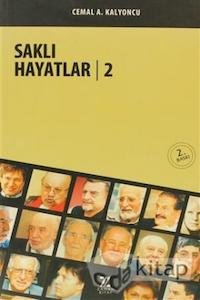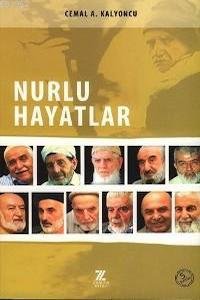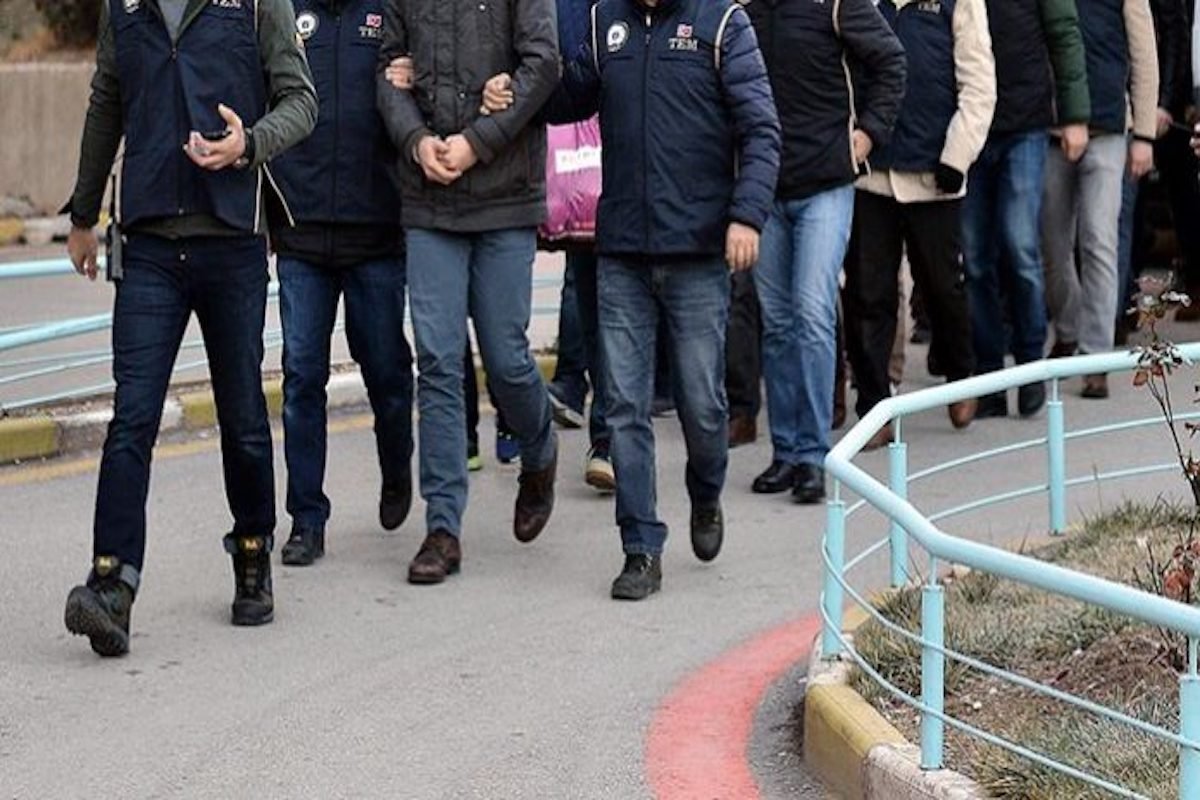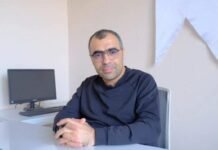Cemal Kalyoncu, Turkey’s one of the leading biographers and journalist, has been behind bars since July 29, 2016 over social media postings that were deemed critical of the government.
Kalyoncu, 45-year-old journalist, turned himself in when he was away from his home during the police raid after a detention order was issued against him. “In the evening, I heard that they [the police] raided my home [to detain me]. I was away from the city. I am going to the prosecution’s office by myself now,” he wrote from his Twitter account on July 25, 2016.
When he arrived to the court house, he was immediately detained by the police. After four troublesome days in the police detention cell in İstanbul’s Vatan Street, he was arrested and transferred to the notorious Silivri Prison by an İstanbul court. He was charged under abusive anti-terror laws and accused of belonging to a hoax terror organization called ‘FETÖ’, a pejorative acronym that Turkey’s political Islamist government has used to smear the civic Gülen movement.

One of Kalyoncu’s tweets was about his criticism of the government over unlawful seizure of the news weekly magazine Aksiyon for which he had worked for years. The tweet was listed as an evidence of terrorism.
Another message he posted was about widespread blocking of news websites by the government. “These websites blocked: Medyascope, Gazeteport, Rotahaber, ABC Gazetesi and Karşı Gazete,” he wrote. That was included in the pile of criminal evidence that the prosecutor claimed constituted as terrorism evidence.
Even his retweets did not escape from the wrath of partisan prosecutor. His retweet of a message posted by T24 news portal which is not affiliated with the Gülen movement was included in the case file. The message quoted Erdoğan’s major critic and said: “[Fethullah] Gülen: I am calling an international commission to investigate the coup attempt. I will abide by its findings, whatever they would be.”

Kalyoncu appeared before the judges for the first time on March 27, 2017. He rejected all accusations against him including a false claim that he was the founder of Aksiyon magazine.
He told the panel that the prosecutor dismissed the fact that he was a journalist. “I have authored about 300 biographies up to today. I am the holder of a permanent press card,” Kalyoncu emphasized. Permanent press card was issued by the government press agency for those who worked in the media profession for over 20 years in Turkey.
He noted that Aksiyon was a perfectly legally operating media outlet and he cannot be accused of terrorism just because he had worked for the magazine. He underlined that he had nothing to do with the coup attempt on July 15, 2016 and knew no military officers in person.
The hearings in the case of Kalyoncu and 25 other journalists lasted for five days. The court decided to release 21 journalists including Kalyoncu at the completion of first hearing.
The moment after the court’s decision was announced, pro-government journalists including ones from Aydın Doğan’s media group, pro-Erdoğan trolls and figures in social media kicked off a campaign questioning the journalists’ release.

A new detention orders issued and they were taken to the police station from the prison cell in a new cycle of processing that led them back to prison again with new added charges.
Another 8 journalists whom Kalyoncu was one of them, were re-arrested after the prosecutor challenged the release order and the judge issued a new arrest warrant within hours without even examining their cases and hearing the defendants’ arguments.
A few days later three judges who decided to release 21 jailed journalists were suspended by the Turkey’s judicial council the Board of Judges and Prosecutors (HSK).
Kalyoncu appeared at three successive hearings on April 27, 2017, July 27, 2017, December 4, 2017. In every hearing, the court ruled for the continuation of his arrest citing that he posed a flight risk. Ironically Kalyoncu voluntarily surrendered himself to the prosecutor’s office while he could have fled the country or remained at large in Turkey. His next trial will be held on February 8, 2018.

He had continuously worked for 22 years at various departments of the same magazine. He has written so many human-interest stories. He received the Turkish Writers’ Union Best Interview of the Year Award in 1999.
Kalyoncu began writing biographies of Turkey’s both famous and little-known figures. Many readers learned exclusive details about Turkey’s long-established families from his articles. He collected his works in a series of books that were published. The list is as follows:

Derin Gazeteciler (2004 – Deep Journalists)
Paranın Efendileri (2006 – Masters of the Money)
Saklı Hayatlar-2 (2006 – Hidden Lives-2)
20. Yıl Zaman’ı (2007-20th Anniversary of Zaman Daily)
Zinde Söyleşiler (2009 – Interviews at Vigilence)
Nurlu Hayatlar (2009 – Shining Lives)
The government appointed trustees fired Kalyoncu one month after they unlawfully took over the management of the magazine on March 4, 2016. The circulation of Aksiyon that was selling about 50,000 copies before the seizure dramatically dropped to 500 copies in the next week.

He is married with two children.
Turkey is the biggest jailer of journalists in the world. The most recent figures documented by the SCF has showed that 256 journalists and media workers are in jails as of December 7, 2017, most in pre-trial detention languishing in notorious Turkish prisons without even a conviction. Of those in Turkish prisons, 230 are arrested pending trial, only 26 journalists remain convicted and serving time in Turkish prisons. An outstanding detention warrants remain for 135 journalists who live in exile or remain at large in Turkey.
Detaining tens of thousands of people over alleged links to the Gülen movement, the government also closed down more than 180 media outlets after the controversial coup attempt.
Turkey survived a controversial military coup attempt on July 15, 2016 that killed 249 people. Immediately after the putsch, the Justice and Development Party (AKP) government along with President Erdoğan pinned the blame on the Gülen movement.
Gülen, who inspired the movement, strongly denied having any role in the failed coup and called for an international investigation into it, but President Erdoğan — calling the coup attempt “a gift from God” — and the government initiated a widespread purge aimed at cleansing sympathizers of the movement from within state institutions, dehumanizing its popular figures and putting them in custody.
Turkey has suspended or dismissed more than 150,000 judges, teachers, police and civil servants since July 15. Turkey’s Justice Ministry announced on July 13 that 50,510 people have been arrested and 169,013 have been the subject of legal proceedings on coup charges since the failed coup.
















